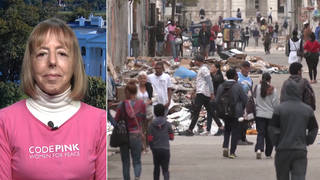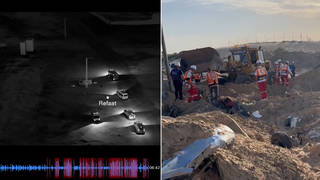
Among the executive orders President Trump signed Monday are two that aim to eliminate so-called cashless bail. The move threatens to cut federal funding to Washington, D.C., as well as other cities and jurisdictions that continue to implement the economic and racial justice policy. Before cash bail was eliminated, “judges would come up with a number out of thin air, and the decision about whether somebody was released was based upon whether they had a rich grandma or rich aunt or a girlfriend who was willing to put up the money,” says Sharone Mitchell, chief of the Law Office of the Cook County Public Defender.
This comes as Trump has continued to single out D.C., as well as Democratic-led cities like Chicago, engaging in racist and baseless rants about a violent crime wave as he threatens to expand his military occupation. “I’m a lawyer. I will tell you lots of legal arguments. I’m not sure the law matters anymore,” says Mitchell.
Transcript
AMY GOODMAN: I want to bring into this conversation another Chicago guest. Two other executive orders President Trump signed Monday, which are drawing nationwide backlash, they aim to eliminate so-called cashless bail and threaten to cut federal funding to D.C. and other jurisdictions that keep the policy in place. Cashless bail was a system in which people accused of minor offenses are released from jail while awaiting trial without having to pay a specific cash amount. This is President Trump.
PRESIDENT DONALD TRUMP: Cashless bail. They thought it was discriminatory to make people put up money because they just killed three people lying on a street, any street, all over the country. Cashless bail, we’re ending it.
AMY GOODMAN: So, two years ago, Illinois became the first state to eliminate cash bail.
For more, we’re joined in Chicago by Sharone Mitchell Jr. He leads the Cook County Public Defender’s Office, was part of a coalition that supported the bill to remove money from the bail process in Illinois.
Welcome to Democracy Now!, Mr. Mitchell. I’m wondering if you can start off by explaining what cashless bail is. I know you don’t even like that term. But explain the significance of President Trump’s attack not only on Illinois, but around the country.
SHARONE MITCHELL JR.: Thank you so much for having me. I’m a true fan of the show, and it’s great to be here.
Listen, this is — this is tyranny. This is what kings do. A duly elected state Legislature passed a criminal justice reform package to improve the quality of bail decisions in 2021. It was put in play in 2023. And despite predictions from the right, the bail system did not fail. Crime did not explode. And Trump has decided that he doesn’t like the policy, not because of the facts or the data, but because of the politics, so he literally issues an executive order that threatens to starve the state — Republicans, Democrats, poor people, Black people, Brown people, Asian people, white people, all people — until the duly elected Legislature bends to his will, not because they agreed with him, but because they decide to bend to his threat. Your last guest talked about Mafia-style threats. Amy, this ain’t different.
What this reform is, is when a judge — when somebody goes before a judge, after they’ve been accused of an offense, that we’re not using money to make the determination about whether that person remains in jail now. The old system was broken, and people on both sides of the aisle really hated it. There were people that felt that people who were accused of crimes could buy their way out of jail despite their risk of harm or threat to leave the jurisdiction. And there were people that looked at the jail population and said these people remain in jail because of their lack of ability — their inability to pay bail amounts, not because of some finding by a judge. The old system was a disaster.
And you saw predictions that these changes could blow up the system or explode crime. And it didn’t. The system is working. It’s been working since September of 2023. But despite all that, despite the duly elected Legislature coming up with the reform, an entire reform package, and being — taking two years to put into place, and actually putting in place, Trump has decided to resort to Mafia-style tactics. And it’s another line — it’s another move in a long line of policies that are just intended to destabilize the efforts to reduce crime in the city.
JUAN GONZÁLEZ: Trump is threatening to do what? He’s going to withhold federal funds from local jurisdictions that don’t — that remove money from the bail process? Is there any way to stop this, or is it even legal?
SHARONE MITCHELL JR.: I’m a lawyer. I will tell you lots of legal arguments. I’m not sure the law matters anymore, right?
You know, my hope is that — well, this is what I know. I know there will be lots of resistance. I know that there is a commitment to this policy, because the policy works. It isn’t perfect, but no judge has been given a crystal ball. These are difficult decisions. But the old decision — the old process was awful. We had hearings that last 37 seconds, and then judges would come up with a number out of thin air, and the decision about whether somebody was released was based upon whether they had a rich grandma or rich aunt or a girlfriend who was willing to put up the money. And women, mainly Black and Brown women, had to make the decision about whether they were going to pay the rent or whether they were going to buy their loved one’s freedom. So, I know there is lots of energy in this community, in this city, in this region, in this county, in this state, to protect these reforms. And I know there are going to be thousands of people out there trying to protect them.
JUAN GONZÁLEZ: And we only have about a minute or so left, but didn’t the Illinois Supreme Court already rule in favor of this legislation?
SHARONE MITCHELL JR.: Absolutely. The legislation was passed in 2021. There was an intentional two-year ramping-up period, because it is a significant change. At the last second, there was, essentially, an injunction filed. They went through the process, from January of 2023 to September of 2023. The Illinois Supreme Court found it to be constitutional. And we have two years, essentially, of success of this policy.
Yet and still, Trump is playing politics, not caring about the people of Cook County, of Chicago. And again, it’s another step in destabilizing the city. We’ve seen community violence intervention dollars, things that help drop the murder rate, being stripped away, defunded from our communities. And this will also hurt communities, as we know that jail, especially inappropriate jail, reduces the criminological factors — or, increases the criminological factors that bring people back into the criminal legal system. People can’t get jobs. People can’t get education. And they resort to things that we don’t like, because the system intentionally starves them of the resources they need to contribute to our communities.
AMY GOODMAN: Sharone, I want to thank you very much for being with us. Of course, we’ll continue to look at this story. Sharone Mitchell Jr., chief Cook County public defender, part of the coalition that helped support the bill to remove money from the bail process. Thanks also to Chicago Alderperson Byron Sigcho-Lopez, alderperson of the 25th Ward in Chicago and chair of the Housing and Real Estate Committee of the Chicago City Council. We will continue to follow these stories and what happens on Labor Day.
This is Democracy Now!, produced with Mike Burke, Renée Feltz, Deena Guzder, Messiah Rhodes, Nermeen Shaikh, María Taracena, Nicole Salazar, Sara Nasser, Charina Nadura, Sam Alcoff, Tey-Marie Astudillo, John Hamilton, Robby Karran, Hany Massoud and Safwat Nazzal. I’m Amy Goodman, with Juan González.











Media Options